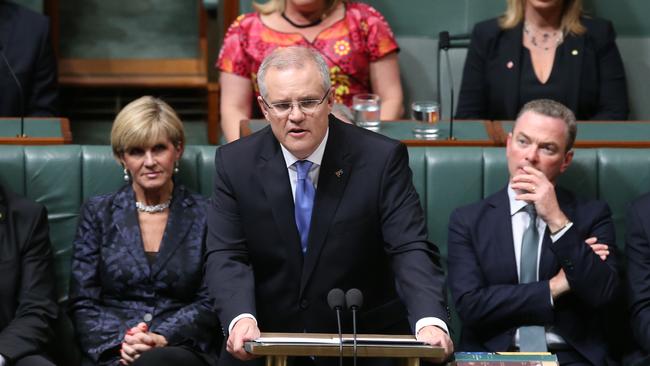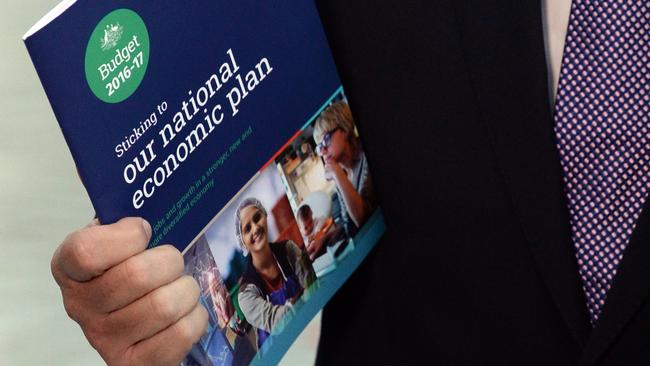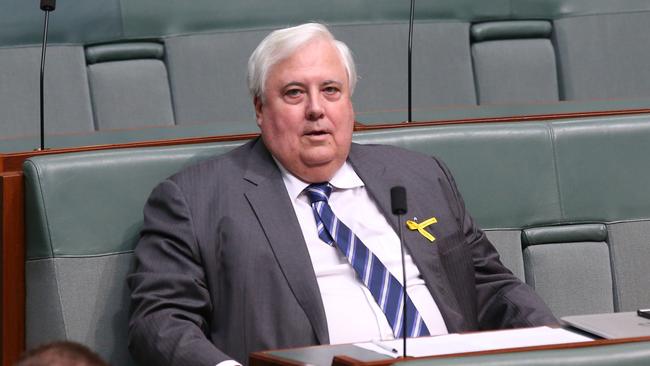Budget 2016 Live Coverage: What it means for you
Voters are being offered $4bn in tax cuts and $5.3bn in small business help, as the Treasurer’s first budget targets retirement nest eggs.
BUDGET 2016: Follow live coverage and reaction after Scott Morrison handed down his first budget. What do you think? Tell us in the comments section below.
10.10pm:‘Tax cut for big business’
Shadow treasurer Chris Bowen says the budget delivered a tax cut for big business and the rich at the expense of families.
“The difference between Labor and Liberal could not be more stark - we’ll put people first, while the 2016 budget has shown the Liberal party will look after high income earners and multinationals,” said Mr Bowen, who pledged to reinstate the two per cent deficit levy on high income earners if Labor wins government in July.
The budget deficit for 2015/16 is now expected to be a hefty $39.9 billion - the fifth largest on record - and more than the $37.5 billion predicted in the mid-year review Mr Bowen said the government was elected on the mantra of fixing the budget deficit.
“Tonight’s budget makes it worse,” he told ABC TV.
9.50pm:Super - want the good news first?
Richer superannuants are going to get slugged, but the system is set to be fairer for women. James Kirby explains all ...
9.40pm:ABC news budget cut to $41.4m
A couple of lines from media editor Darren Davidson out of tonight’s budget. The ABC will have its Enhanced Newsgathering budget cut to $41.4m over three years, down from $69.4 million over four years while commercial TV networks and radio broadcasters have had their prayers partially answered by the Turnbull government with a 25 per cut to licence fees.
The pay-TV industry has hit out at licence fee cuts for the commercial networks, saying taxpayers will “foot an unconditional handout” of approximately $150m.
9.25pm:Death of work for the dole
9.10pm:‘A budget for the long, hard slog’
“I’ve called this a ‘trust us, vote now’ budget from Morrison and Turnbull and by that I mean this is a budget for the times. It’s a budget for the long, hard slog.”
Watch the full analysis by Editor-At-Large Paul Kelly.
8.50pm:Tobacco company ‘furious”
No surprises here but cigarette makers are “furious” the federal government opted to hike taxes on tobacco.
The tobacco excise will rise 12.5 per cent in each year to 2020 which is likely to lift the cost of a packet of cigarettes to $40 or more.
Imperial Tobacco Australia has now accused Treasurer Scott Morrison of going back on his word after he smacked Labor for considering a similar plan.
8.35pm:Budget reaction: what they said
Reaction is starting to come in following Morrison’s budget, which has promised $5.3bn in help for small and medium sized business in a bid to unleash more economic growth.
“The budget had two big tasks this year - stay on course to a credible structural surplus, while equipping the economy with the means for faster growth to support long-term jobs and prosperity. On these two measures, tonight’s budget is heading in the right direction.” - Business Council of Australia chief executive Jennifer Westacott.
“Despite grand rhetoric, the budget is a timid, low-risk budget that fails to address the fundamental challenges facing the Australian economy, and represents a missed opportunity.” - Tim Andrews, executive director of the Australian Taxpayers Alliance.
“It means $925 million out of the pockets of everyday Australians. It means people are going to have to pay more out of their pockets when they receive medical treatment.” - Australian Medical Association president Brian Owler on the decision to extend freeze on Medicare rebates until 2020.
“Introducing new measures to support business and delivering stimulus to the hip pocket on top of the RBA interest rate cut will be just what the doctor ordered for retail.” - Australian Retailers Association executive director Russell Zimmerman.
8.25pm:Building wealth just got harder
With little warning – and zero consultation – Scott Morrison has invaded the superannuation system, writes James Kirby. In doing so, hitting not just obvious targets such as high earners but also people already in retirement. Put simply, the changes make superannuation considerably less attractive and moreover, the new measures make it very hard to actually accumulate any reasonable level wealth.
What should retirees and supersavers do now? Full detais HERE
8.15pm:Budget at a glance
Everything you need to know in byte-sized form from our experts at The Australian.
8pm:How did Morrison do?
And that is that - let the analysis begin ...
Scott Morrison has now handed down his first budget and Alan Kohler reckons the treasurer has passed the ideas test.
‘The budget is a good effort in difficult times. As long as you’re not a self-funded retiree who smokes like a chimney. You can read his full analysis HERE.

7.30pm:Morrison targets super to fund tax cuts
Voters are being offered $4 billion in income tax cuts and $5.3bn in help for small and medium sized business in a bid to unleash more economic growth as the Turnbull government confronts a deepening budget deficit, writes David Crowe.
The tax relief is funded by a bigger-than-expected hit to retirement nest eggs that will raise $2.9bn, along with a $2bn saving from a retreat on its higher education reforms and a $1.2bn saving from a delay to the families package at the heart of the last budget.
Choosing the cuts and spending measures carefully ahead of the federal election, the government has added just $1.7bn to the budget bottom line over the next four years.
Delivering his first budget, Treasurer Scott Morrison labelled it a “new economic plan” for difficult times, scaling back the economic growth forecast from 2.75 per cent to 2.5 per cent for next financial year.
The unemployment rate is expected to improve compared to December’s official forecasts, holding at 5.5 per cent over the four years to 2020 rather than hitting 6 per cent next year.
In an optimistic outlook likely to be challenged by economists, the Treasurer is counting on a jump to 3 per cent in real economic growth from 2017-18 to help take the budget to surplus early next decade.
“At such a sensitive time, none of us can become complacent or make decisions that could put our successful transition at risk. There is too much at stake,” Mr Morrison said in his budget speech.
The federal budget reveals deficits of $118.5bn over the four years to June 2019 compared to an estimate of $108.3bn in December for the same period, a $10.2bn setback that is mostly the result of another blow to the government’s revenue forecasts.
The deficit for next financial year is now forecast to be $37.1bn compared to $33.7bn in December’s budget update, a deterioration of $3.4bn.
Highlighting years of failure in scaling back deficits, the coming year’s deficit is now likely to be almost twice the $17.7bn prediction for the same year when Joe Hockey unveiled his first budget statement as treasurer in late 2013 — an outlook that was criticised at the time for being too grim.
Modest tax relief is being offered to workers earning more than $80,000 who risk moving into a higher tax bracket as the result of inflation — a “bracket creep” that will be prevented by lifting the threshold to $87,000.
A worker earning $81,000 would get a tax cut worth $45 for the year if the cuts come into effect as planned on July 1. A worker on $87,000 and above would get a tax cut worth $315 a year.
Throwing Labor onto the defensive, Mr Morrison is challenging Opposition Leader Bill Shorten to back the tax cuts despite complaints they overlook workers earning less than $80,000 a year.
The business tax changes are the biggest single package in the budget, giving help to small and medium-sized businesses and ensuring that unincorporated businesses are better off when they cannot get the benefit of a lower company tax rate.
The company tax rate will fall from 28.5 per cent to 27.5 per cent for small businesses. The group that qualifies for the lower rate will be expanded from those with turnover of $2 million to a new benchmark of $10m.
“This will mean 870,000 businesses, employing 3.4 million Australians, will have their tax rate reduced,” Mr Morrison said.
Unincorporated businesses will get an increase in their small business tax discount and get the benefit, along with companies, of an extension in the instant asset write-off for purchases of up to $20,000 — a popular concession to businesses with turnover of less than $10m.
Superannuation tax changes are more sweeping than predicted and include a $1.6m “transfer balance cap” that will impose higher taxes on wealthier retirees whose balances exceed that amount.
As expected, Mr Morrison is matching Labor policy by increasing super contributions tax from 15 to 30 per cent for those earning more than $250,000 a year.
The concessional cap on super contributions will be reduced from $30,000 to $25,000 to limit the scope for people to put more into their retirement funds every year.
As well, the $180,000 non-concessional contributions cap will be replaced with a “lifetime” non-concessional cap of $500,000 — blocking all Australians from depositing more than that amount in lump sums or a series of lump sums as they approach retirement.
7.20pm:Any surprises likely?
Ten minutes to go. Before settling back to watch the livestream above, take five minutes to check out what we can expect to see and what the voters want to see ahead of the treasurer’s first budget.
7pm:What the experts say
A reminder of what is coming up: Mr Morrison will hand down his budget at 7.30pm, which you can livestream here. Political Correspondent David Crowe will guide you through the key points with a comprehensive wrap-up, with Dennis Shanahan and Alan Kohler providing analysis and reaction.
Then join Paul Kelly, Chris Kenny and Judith Sloan as they discuss if the Turnbull government got it right, with continuing reaction and analysis on the live blog.

6.50pm:Committee urges CSIRO job cut delay
In other news this evening, a parliamentary committee has urged the government to intervene and halt job cuts at the CSIRO until after the federal election.
The Senate inquiry into government budget measures also recommended the CSIRO board undertake a review of its staff reduction process before it goes ahead with any cuts.
6.30pm:Tax change to set up Labor fight
Small business is to be at the heart of this budget and nearly one million small and medium-sized businesses will be handed a tax cut from July 1.
Morrison will cut the company tax rate for small firms from 28.5 per cent to 27.5 per cent and make the surprise move to lift the eligibility threshold from $2 million in turnover to $5m. The company tax changes will set up a political fight with Labor, which believes a lower company tax rate is a good aspiration but has prioritised increased health and education spending. The government will argue that the company tax cut for small and medium-sized businesses will drive employment and increase investment and innovation as part of its jobs-and-growth plan.
#Budget2016 is handed down in 1 hour. You can access all Budget papers at https://t.co/hTwLxhAx4s pic.twitter.com/ttju2jjL06
— Australian Treasury (@Treasury_AU) May 3, 2016
6.10pm:What the numbers show
Can’t wait another 50 minutes? Check out our budget interactive which has tracked budget balance, economic growth, business investment, unemployment and inflation since 1992, sourced from the budget papers. It will, of course, be updated after Morrison’s first budget at 7.30pm
5.40pm:Budget’s hidden messages
Robert Gottliebsen will be involved in covering the budget for the 42nd time tonight, having seen off 13 treasurers.
“Each year I enjoy communicating with readers some of the hidden messages that are contained in every budget. And Scott Morrison’s 2016 budget will be no exception and I will be with you when he concludes his speech this evening. For Scott Morrison to join the two great treasurers of that 42-year period, Peter Costello and Paul Keating (alphabetical order), he has to personally go through the budget line by line and cut out the waste. That’s what they did.”
You can read his full budget preview here.
5.20pm:‘Never been a more exciting time ... again’
Malcolm Turnbull has used his Facebook page to remind voters this is a budget dedicated to driving jobs and growth, just in case anybody had forgotten.
4.50pm:Stocks soar on RBA’s rate cut
The Australian sharemarket has soared following the Reserve Bank’s historic interest rate cut. The lift returned the market to its highest close since October — before the financial markets turmoil that rocked it and global peers early in the New Year, amid concerns about China’s growth prospects. At the 4.15pm (AEST) official market close, the benchmark S&P/ASX 200 index had advanced 110.8 points, or 2.11 per cent, higher to 55353.8, while the broader All Ordinaries index had jumped 103 points, or 1.94 per cent, to 5415.
4.30pm:Palmer’s rare appearance
What is the verdict on the Budget Day Question Time? It may be Budget Day, but all eyes are on the election, writes Jared Owens.
“The Coalition’s sharks have detected blood in the water and were relentless in their pursuit of Labor over the $19.5 billion revenue writedown associated with its plan to hike tobacco taxes . . . Poking black holes in the opposition’s costings is a tried and true path to electoral success and the government would quite rightly think it’s landed some heavy blows on the ALP today.”
Plus, a rare appearance by Clive Palmer in parliament did little to suggest anything other than the fact the Fairfax MP is a spent force in parliament.

4.10pm:‘Poor economic management’
Shadow treasurer Chris Bowen said the decision to cut the rate is a reflection of the government’s poor economic management. “So while low interest rates are welcome, now is not the most exciting time for hard working Australians who can’t get a decent wage rise and can’t afford a house.”
3.50pm:The sting in the interest rate cut?
‘If the Australian banks pass on the RBA reduction in full to borrowers, either their shareholders, or depositors, business borrowers or fee-payers — or a combination of anyone and everyone other than aspiring homeowners — will end up experiencing at least some pain.’ - Stephen Bartholomeusz reflects on the historic rate cut.
3.30pm: PM attacks Labor on negative gearing
The Prime Minister has seized on the Reserve Bank’s comments about the weakening housing market to attack Labor’s negative gearing policy.
“The housing market is trending downwards — a correction, you might think — but you have to ask yourself: why would Australians risk a kick-in-the-guts to the housing market right at the point where it’s vulnerable?” the PM said. “The governor’s remarks … support the economic case that the government is making, support our commitment to strong growth and jobs, and continuing the successful transition from a mining-construction boom to a more diverse economy.”
Earlier, RBA governor Glenn Stevens said in a statement: “Inflation has been quite low for some time and recent data were unexpectedly low. While the quarterly data contain some temporary factors, these results, together with ongoing very subdued growth in labour costs and very low cost pressures elsewhere in the world, point to a lower outlook for inflation than previously forecast.”
3.15pm:RBA slashes rates
Welcome to live coverage of the 2016 Federal Budget, but it is the historic low interest rates stealing Mr Morrison’s thunder this afternoon as fear of a job-destroying deflationary spiral compelled the Reserve Bank to cut interest rates to 1.75 per cent.
NAB was the first big bank off the block to pass on the cut, pledging to reduce its variable home loan rate by 0.25 per cent from May 16.
At its meeting today, the Board decided to lower the cash rate by 25 basis points to 1.75 per cent - https://t.co/ahK2GWuwLx
— RBA (@RBAInfo) May 3, 2016
With agencies










To join the conversation, please log in. Don't have an account? Register
Join the conversation, you are commenting as Logout